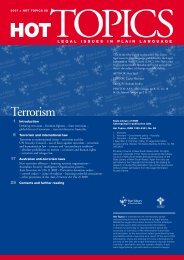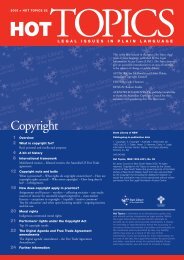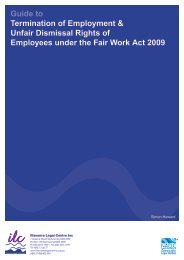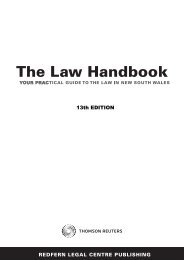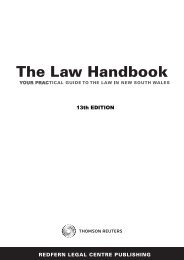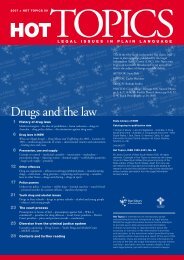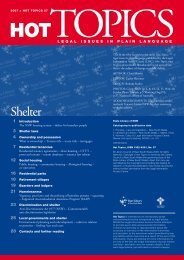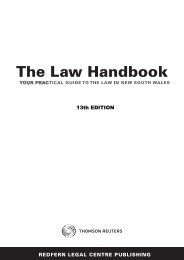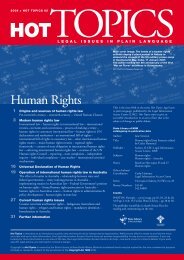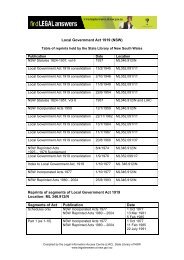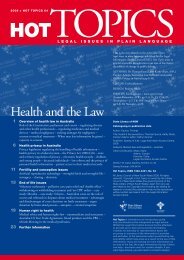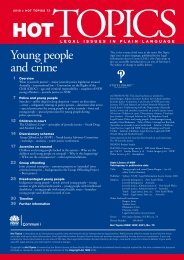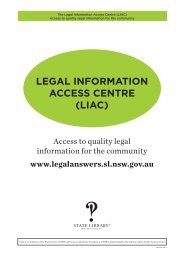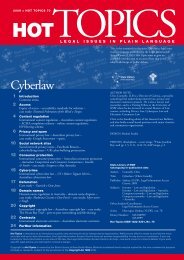Prisoners - Legal Information Access Centre - NSW Government
Prisoners - Legal Information Access Centre - NSW Government
Prisoners - Legal Information Access Centre - NSW Government
You also want an ePaper? Increase the reach of your titles
YUMPU automatically turns print PDFs into web optimized ePapers that Google loves.
withdrawal of privileges for up to 56 days (includes<br />
things like access to television, radio, films, videos,<br />
CDs and DVDs, leisure activities, ability to purchase<br />
goods, contact visits and keeping of approved<br />
property);<br />
> confinement to a cell for up to 7 days with or without<br />
deprivation of privileges;<br />
> imposing a penalty may be deferred conditional upon<br />
good behaviour for uup to two months;<br />
> cancellation of payments for a period of up to two<br />
weeks.<br />
Serious offences are referred to a Visiting Magistrate<br />
who can impose more extensive punishments, including<br />
extending the inmate’s sentence by up to six months.<br />
The Visiting Magistrate will refer the matter to the<br />
Local Court where the offence constitutes a criminal<br />
offence. A decision of the Visiting Magistrate may be<br />
appealed to the District Court under Part 3 of the<br />
Crimes (Local Courts Appeal and Review) Act 2001.<br />
BAnKing And purcHAsing<br />
Correctional facilities are cashless environments –<br />
inmates have a prison account where money from their<br />
families or from work programs is deposited. This<br />
account is used to make purchases from the prison ‘buyup’,<br />
items such as toothpaste, soap, tobacco, tea, coffee,<br />
canned food, soft drinks and cereal.<br />
mAil<br />
Inmates are able to send and receive letters and parcels<br />
to and from any other person. The material sent by an<br />
inmate must not be threatening, abusive, indecent or<br />
obscene. The general manager may open and inspect<br />
letters and parcels, and may confiscate any prohibited<br />
goods. There are some bodies that are exempt from<br />
having correspondence opened, for example the <strong>Legal</strong><br />
Aid Commission, the Ombudsman, the Judicial<br />
Commission. 94 Stricter regulations apply to prisoners<br />
with the highest classification – category AA male<br />
inmates and Category 5 female inmates.<br />
TelepHOne cAlls<br />
Unconvicted inmates are permitted to make up to<br />
three local or fringe area telephone calls per week<br />
at departmental expense. Their legal telephone calls<br />
are also made at departmental expense. Convicted<br />
inmates are permitted to make one local or fringe<br />
area call per week at departmental expense. Telephone<br />
calls for humanitarian purposes such as illness, death<br />
in the family or birth of a child should be provided<br />
without delay and in addition to the inmate’s normal<br />
entitlements. Inmates are permitted to contact mobile<br />
telephones.<br />
Inmate calls to personal telephone numbers may be<br />
monitored and/or recorded. Calls may be terminated by<br />
a correctional officer if they believe that it will ‘prejudice<br />
good order and security of any correctional centre’<br />
(clause 110). There is a limit to the number of calls and<br />
faxes that an inmate can make per week, which depends<br />
on their classification and is fixed by the Commissioner.<br />
The cost of additional calls is generally to be met by<br />
the inmate, with some exceptions, such as calls to<br />
the Ombudsman, Independent Commission Against<br />
Corruption or <strong>Legal</strong> Aid Commission (see clause 111).<br />
Possession of a mobile telephone (or camera, video or<br />
audio recorder) is a correctional centre offence.<br />
visiTs<br />
A correctional centre will have set visiting hours, and<br />
visits are usually a minimum of 30 minutes. The general<br />
manager can authorise visits outside of visiting hours in<br />
some circumstances. The details of all visits are recorded.<br />
There are a range of ‘special’ visits which include visits<br />
by a legal practitioner, visits by a diplomat to foreign<br />
nationals, visits to Aboriginal inmates by the Aboriginal<br />
<strong>Legal</strong> Service field officer. The Commissioner can<br />
restrict particular people from visiting, and can restrict<br />
the type of visit (eg make it a non-contact visit). An<br />
inmate is entitled to refuse to see a visitor unless it is a<br />
government official.<br />
A visitor may be refused entry if they are believed to be<br />
under the influence of drugs or alcohol. Visitors may<br />
be required to provide proof of identity and a reason<br />
for their visit. They may have their personal possessions<br />
searched and inspected (including use of a sniffer dog<br />
and scanner). Prior permission must be obtained for<br />
visitors to take photographs or other recordings inside<br />
a correctional centre. Visits must be in sight of a<br />
correctional officer and are designated as ‘contact visits’<br />
where physical contact is permitted, or ‘non-contact<br />
visits’ where contact cannot take place. Visits may be<br />
terminated:<br />
> if the visitor is considered to have behaved in<br />
contravention of the relevant legislation;<br />
> if the visitor has behaved threateningly or offensively;<br />
> in the interests of the visitor;<br />
> in the interests of the security of the correctional<br />
centre.<br />
94. For the full list of exempt organisations see Crimes (Administration of Sentences) Regulation 2008 see the entry for ‘exempt organisations’ in the<br />
dictionary section at the end of the regulation, available at www.legislation.nsw.gov.au<br />
26<br />
HOT TOPICS 67 > <strong>Prisoners</strong>



